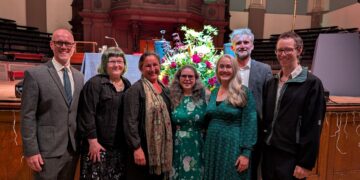By Sarah Browning
As the school holidays come to an end and children return to school, I’ve been thinking about kindness and young people. There are so many times when they are kind and it’s good to celebrate that.
Kindness tools and attitude
Factors such as the pandemic and the cost of living crisis put increasing pressure on young people’s mental health. In response, schools are building on their measures to support their students. Many are now explicitly talking about being kind as a value for their school community. Programmes such as the School of Kindness, from the charity 52 Lives, teach younger children the tools to enhance and develop their natural kindness.
When I ran a stall at a community festival earlier in the year, I discovered that children are prepared to describe themselves in ways that adults aren’t. We had several kids whose story of kindness was about things they had done themselves. It was really refreshing to be having conversations with people who weren’t embarrassed about recognising themselves as kind.
I would love it if we can one day get to a place where adults are proud to describe themselves as kind and not feel that it is somehow showing off or, worse, revealing weakness.
Teenagers and kindness
If you watch the mainstream news on a regular basis, you could be forgiven for thinking the worst about teenagers. And while there are some who, for many reasons, follow a less positive path, there are many, many more who do not. I regularly hear stories of kindness about young people who are doing things such as looking after siblings and helping a new classmate find their way around school.
Stories about kind teenagers are always popular on my Time for Kindness website. These have included:
• Two teenagers who stopped to help an older woman who had a fall in the street
• A girl who made a donation to the charity Crisis
• A group of teenagers who message each other reminders of the equipment they need for school each day
• A teenager who gave her gloves to a street homeless man on the grounds that “he needs them more than I do”
Notice and celebrate
I believe it’s important to notice and celebrate these examples:
• Our young people have been through a lot over the last few years and we should acknowledge how resilient they are.
• It will become a self-fulfilling narrative – the more young people hear these stories about themselves, the more confident they will feel to keep being kind.
• It’’s a more uplifting and positive view of the world for those of us of more mature years to notice and celebrate kindness.
So next time you’re in the company of the young people in your life – or out and about in your neighbourhood – why not make a conscious effort to look out for children and teenagers who are sharing kindness? I’m sure it will warm your heart and give you hope that our future is in safe hands.
Sarah Browning is a Kindness Cheerleader, Communicator and Strategist. For more inspiring stories of kindness, visit: www.timeforkindness.co.uk























